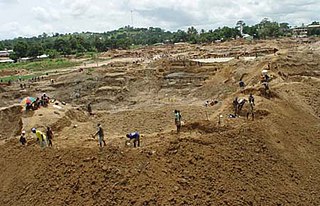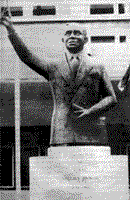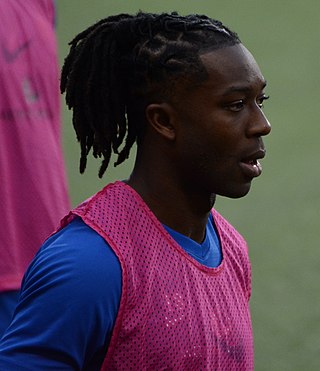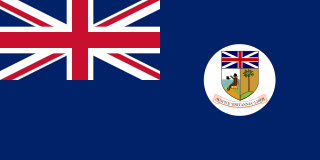Related Research Articles

Sierra Leone, officially the Republic of Sierra Leone, is a country on the southwest coast of West Africa. It shares its southeastern border with Liberia, and the northern half of the nation is surrounded by Guinea. Covering a total area of 71,740 km2 (27,699 sq mi), Sierra Leone has a tropical climate, with diverse environments ranging from savanna to rainforests. The country has a population of 7,092,113 as of the 2015 census. Freetown is the capital and largest city. The country is divided into five administrative regions, which are subdivided into 16 districts.
Sierra Leone first became inhabited by indigenous African peoples at least 2,500 years ago. The Limba were the first tribe known to inhabit Sierra Leone. The dense tropical rainforest partially isolated the region from other West African cultures, and it became a refuge for peoples escaping violence and jihads. Sierra Leone was named by Portuguese explorer Pedro de Sintra, who mapped the region in 1462. The Freetown estuary provided a good natural harbour for ships to shelter and replenish drinking water, and gained more international attention as coastal and trans-Atlantic trade supplanted trans-Saharan trade.

The economy of Sierra Leone is $4.082 billion by gross domestic product as of 2018. Since the end of the Sierra Leone Civil War in 2002, the economy is gradually recovering with a gross domestic product growth rate between 4 and 7%. In 2008 it in PPP ranked between 147th by World Bank, and 153rd by CIA, largest in the world.

Sierra Leone maintains formal relations with many Western nations. It also maintains diplomatic relations with the former Soviet Bloc countries as well as with the People's Republic of China.

Isaac Theophilus Akunna Wallace-Johnson was a Sierra Leonean, British West African workers' leader, journalist, activist and politician.

The Mano River is a river in West Africa. It originates in the Guinea Highlands in Liberia and forms part of the Liberia-Sierra Leone border.
The Sierra Leone Labour Congress (SLLC) is a national trade union center in Sierra Leone. It was founded in 1976.

Sierra Leone – United States relations are bilateral relations between Sierra Leone and the United States.

Michael Lahoud is a Sierra Leonean former footballer and former broadcaster for Austin FC. He also holds American citizenship.
Fula people of Sierra Leone is the fourth major ethnic group in Sierra Leone after the Temne, Mende and Limba ethnic groups and a branch of the Fula people of West Africa. The Fula make up about 3.4% of Sierra Leone's population. The Sierra Leone Fula people settled in the Western Area region of Sierra Leone more than four hundred years ago as settlers from the Fouta Djallon Kingdom that expanded to northern Sierra Leone.
SALPOST is the national post office of Sierra Leone.

Sierra Leone, officially the Republic of Sierra Leone, is a Constitutional Republic in West Africa. Since it was founded in 1792, the women in Sierra Leone have been a major influence in the political and economic development of the nation.

Visitors to Sierra Leone must obtain a visa from one of the Sierra Leonean diplomatic missions unless they come from one of the visa exempt countries.

The Sierra Leone Creole people are an ethnic group of Sierra Leone. The Sierra Leone Creole people are descendants of freed African-American, Afro-Caribbean, and Liberated African slaves who settled in the Western Area of Sierra Leone between 1787 and about 1885. The colony was established by the British, supported by abolitionists, under the Sierra Leone Company as a place for freedmen. The settlers called their new settlement Freetown. Today, the Sierra Leone Creoles are 1.2 percent of the population of Sierra Leone.Sierra Leone.

Kenya–Sierra Leone relations are bilateral relations between Kenya and Sierra Leone.
The following list is of events that happened during 2005 in Sierra Leone. Sierra Leone, a country in West Africa, has a special significance in the history of the transatlantic slave trade as the departure point for thousands of west African captives. The capital, Freetown, was founded as a home for repatriated former slaves in 1787. But the country's modern history has been overshadowed by a brutal civil war that ended in 2002 with the help of Britain, the former colonial power, and a large United Nations peacekeeping mission. Sierra Leone has experienced substantial economic growth in recent years, although the ruinous effects of the civil war continue to be felt. The country is also rich in diamonds and other minerals. The trade in illicit gems, known as "blood diamonds" for their role in funding conflicts, perpetuated the civil war. The government has sought to crack down on the trade.

India–Sierra Leone relations refers to the international relations that exist between India and Sierra Leone. India maintains a High Commission in Freetown. Sierra Leone does not have a resident diplomatic mission in India. The Sierra Leonean embassy in Abu Dhabi, United Arab Emirates is accredited to India.

The Colony and Protectorate of Sierra Leone was the British colonial administration in Sierra Leone from 1808 to 1961, part of the British Empire from the abolitionism era until the decolonisation era. The Crown colony, which included the area surrounding Freetown, was established in 1808. The protectorate was established in 1896 and included the interior of what is today known as Sierra Leone.
The Gambian Creole people, or Krio or Aku, are a minority ethnic group of Gambia with connections to and roots from the Sierra Leone Creole people. In Gambia the Aku account for about 2% of the population. Some estimates put the figure higher. However, according to the 2013 Gambian Census, the Aku make up 0.5% of the population or around 8,477 people.

Sierra Leonean nationality law is regulated by the Constitution of Sierra Leone, as amended; the Citizenship Act, and its revisions; and various international agreements to which the country is a signatory. These laws determine who is, or is eligible to be, a national of Sierra Leone. The legal means to acquire nationality, formal legal membership in a nation, differ from the domestic relationship of rights and obligations between a national and the nation, known as citizenship. Nationality describes the relationship of an individual to the state under international law, whereas citizenship is the domestic relationship of an individual within the nation. In Britain and thus the Commonwealth of Nations, though the terms are often used synonymously outside of law, they are governed by different statutes and regulated by different authorities. Sierra Leonean nationality is based on descent from a person who is Negro-African, regardless of whether they were born in Sierra Leone, jus soli, or abroad to a Sierra Leonean, jus sanguinis. The Negro clause was inserted based upon the founding of the colony as a refuge for former slaves to prevent economically powerful communities from obtaining political power. It can be granted to persons with an affiliation to the country, or to a permanent resident who has lived in the country for a given period of time through naturalisation.
References
- ICTUR; et al., eds. (2001). Trade Unions of the World (5th ed.). London, UK: John Harper Publishing. p. 286. ISBN 9780953627844. OCLC 43418064.